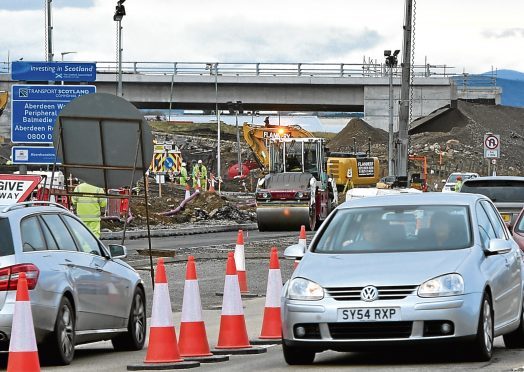One of the partners building the Aberdeen city bypass road is at the heart of a probe by the UK’s financial watchdog, it was announced yesterday.
The Financial Conduct Authority (FCA) said it was investigating the “timeliness and content” of announcements made by troubled construction giant Carillion between December 7, 2016 and July 10, 2017.
Carillion, which is battling for survival after a string of profit warnings, said it was co-operating fully with the FCA.
The firm is one of three consortium partners building the Aberdeen Western Peripheral Route, alongside Balfour Beatty and Galliford Try-owned Morrison Construction.
Transport Scotland has said Carillion’s woes pose no risk to the remaining work on the AWPR, which is nearing completion. If any one of the partners withdraws, the others will take on extra obligations.
Carillion was thrown into crisis by a hefty profit warning in July, which sent shares tumbling by more than 70% in one week.
A large chunk of an £845million write-down revealed at the time was for three UK projects, one of which is believed to be the AWPR.
The Wolverhampton-based firm took another battering in the City in September after it reported half-year losses of more than £1billion.
In November, the company issued its latest profit warning and said it would breach debt covenants –resulting in another share price collapse, with more than £160million wiped off the group’s market value.
It also said annual profits were likely to be “materially lower than current market expectations” as it grappled with a string of delays and smaller-than-expected improvements to margins on certain contracts.
Carillion recently struck an agreement with its lenders to defer a crucial financial covenant test, which gave the troubled group more breathing space.
And a new chief executive, Andrew Davies, has been parachuted in earlier than planned to replace interim boss Keith Cochrane.
Mr Davies has led construction, property services and development company Wates Group since 2014.
Meanwhile, new figures published yesterday show UK construction output fell last month as commercial building and civil engineering work continued to drag on the industry.
The latest Markit/CIPS UK Construction purchasing managers’ index has a reading of 52.2 for December, down from 53.1 in November and below economists’ forecasts of 53.1. A reading above 50 indicates growth.
Despite the industry struggling to fire on all cylinders, house building levels proved robust and new orders accelerated at the fastest pace since May.
But these bright spots failed to inspire a cheerier outlook, with the balance of firms expecting better output levels in 2018 one of the weakest seen in four-and-a-half years.
